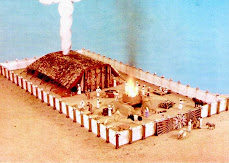Ha’azinu – the Haftara
Hosea 14:2 – 1; Micah 7:18 – 20; Joel 2:15-27
Reading date: 26th September 2009 – 8th Tishrei 5769
Our Highlighted Haftara Text
"Blow a shofar in Zion,
Solemnize a fast,
Proclaim an assembly!
Gather the people,
Bid the congregation purify themselves.
Bring together the old,
Gather the babes
And the sucklings at the breast. Joel 2:15, 16
Solemnize a fast,
Proclaim an assembly!
Gather the people,
Bid the congregation purify themselves.
Bring together the old,
Gather the babes
And the sucklings at the breast. Joel 2:15, 16
I can think of no better way to start the process of Teshuva, than by beginning to be grateful.
On Shabbat Shuvah we read the final haftara of the weekly Shabbat cycle. Like the past few months, the haftara is chosen for its connection to the calendar (this week is the Shabbat between Rosh Hashanah and Yom Kippur), and not the weekly Torah reading of Ha’azinu. The passage from Joel begins, "Blow a shofar in Zion, Sanctify a fast..." After the holidays of Sukkot and Simchat Torah, we will begin a new cycle of Torah readings once again with Parashat Bereishit, and will return to studying the Torah portion.
Every Shabbat can be referred to by the name of the Parasha, (Shabbat Bereishit) or in some weeks, when a special additional portion is read, the Shabbat has a special name taken from this additional 'maftir' (Shabbat Zachor). Sometimes, when a holiday falls on Shabbat and interrupts the regular weekly readings, Shabbat gets its name from the holiday (Shabbat Chol HaMoed Pesach). So, I think it is fitting, that this week, our last column on the haftarot, this Shabbat takes its name (Shabbat Shuvah), not from the Torah portion, but from the haftara: ‘Shuvah Yisrael’, Return O Israel.
The haftara is also unusual in that it is taken from more than one book; selections from Hosea, and Micah or Joel form the haftara (depending on whether the Torah portion Vayelech or Ha'azinu falls on Shabbat Shuvah and whether Ashkenazi or Sephardic custom is being followed). (Note also that the passage from Hosea is included in the regular Shabbat haftara read on Parashat VaYetze.)
History
Hosea is the first prophet included in the second section of the Jewish Bible (Tanach), after the historical books of Joshua, Judges, Samuel and Kings. He lived around 700 BCE and was a contemporary of Amos. After the death of Solomon, the United Kingdom had split into two. The northern tribes were called Israel (or Ephraim after the tribe of their first king Jeroboam) and the southern kingdom was called Judah. Although this was a time of material prosperity, it was also a time of moral laxity and growing paganism.
This is the only haftara that includes a passage from the prophet Joel. Joel speaks of the Day of Judgment, and describes a plague of locusts. The Sages believed Joel was a contemporary of Amos and Hosea, but scholars are unsure of the book's composition. Joel is a short (4 chapter) book, and includes the famous verse: "Your elders shall dream dreams, and your youth shall see visions" (3:1 or 2:28 in some translations). The passage from Joel seems like a description of Rosh Hashanah: "Blow the shofar...Gather the people..."
Commentary
This week's Torah portion Ha'azinu, the last regular Shabbat reading, is a one chapter poem anticipating the Israelites forsaking YHVH. (The Torah's final two chapters are read on Simchat Torah, and then we begin the cycle anew with Shabbat Bereishit.) Moses describes the history of YHVH's relationship with Israel: YHVH is faithful, and the Israelites, in return, worship other gods and do not show gratitude. YHVH's anger will then flare up, and visit famine upon them. The passage from the prophet Joel balances the Torah. Joel too describes a famine caused by a plague of locusts, but YHVH will be roused by the nation's return, and He will again honor the covenant with the Israelites, showering them (literally) with rain, so their crops (of grain, wine, and oil) will be abundant.
Joel says: "And you shall eat your fill and praise the name of Adonai your God Who dealt so wondrously with you...I am Adonai your God, there is no other" (Joel 2:26, 27). This is a paraphrase of Deut. 8:10, "You shall eat and be full, and you shall bless Adonai your God..." In both places, the idea is that the earth's bounty is a gift from God, and that abundance should be a sign of YHVH's blessings. Perhaps because of the family meals around the holidays, I am conscious of feeling overly full. But the Torah worries that instead of being grateful and loyal, precisely the opposite will happen: "When you have eaten your fill, have built fine houses to live in... beware lest your heart grow haughty and you forget Adonai your God who freed you from the land of Egypt..." (Deut 8:12, 14).
How curious. The more we have to be thankful for, the less we seem to be grateful. In Judaism, saying blessings is our way of expressing gratitude. Indeed, the verse quoted above is the 'proof text' for Birkat HaMazon, the Grace after Meals. The rabbis said that one should offer 100 blessings a day! That might seem like a lot, but think of all the people (seen and unseen) that we should be grateful to each day: the bus driver, the grocer, the farmer, the truck driver, the city workers.
It's easy to complain. Nothing is perfect. But how many blessings we have each day! Let us thank those around us, family, friends, and even strangers. In this season of Rosh Hashanah and Yom Kippur, I can think of no better way to start the process of Teshuva, than by beginning to be grateful.
